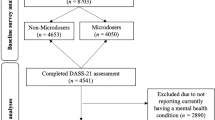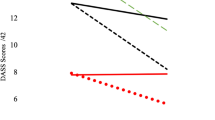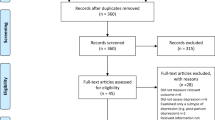Abstract
Although the association between antidepressant drug use and risk of cancer has received considerable attention in the past years, no work has been done specifically on prostate cancer. We carried out a population-based case – control study to assess the risk of prostate cancer in association with exposure to tricyclic antidepressants (TCAs) and selective serotonin reuptake inhibitors (SSRIs). 7767 prostate cancer cases diagnosed between 1981 and 2000 were accrued through the Saskatchewan Cancer Agency. Saskatchewan Health identified a total of 31 068 male controls who were matched on age and calendar time. Data on exposure to TCAs and SSRIs were compiled from the Saskatchewan outpatient prescription drug database, and covered a period upto 24 years. A positive significant association was found between TCA use and risk of prostate cancer, when exposure took place 2–5 years before diagnosis, with rate ratios of 1.31, 1.58, and 2.42 at the low, medium and high average daily dose levels, respectively. Exposure to SSRIs was not found to be significantly associated with the risk of prostate cancer. TCA use 2–5 years in the past was associated with a small dose-dependent increase in the risk of prostate cancer. Nevertheless, detection bias could have contributed to the observed association.
This is a preview of subscription content, access via your institution
Access options
Subscribe to this journal
Receive 4 print issues and online access
$259.00 per year
only $64.75 per issue
Buy this article
- Purchase on Springer Link
- Instant access to full article PDF
Prices may be subject to local taxes which are calculated during checkout
Similar content being viewed by others
References
Iishi H, Tatsuta M, Baba M, Taniguchi H . Enhancement by the tricyclic antidepressant, desipramine, of experimental carcinogenesis in rat colon induced by azoxymethane. Carcinogenesis 1993; 14: 1837–1840.
Brandes LJ, Arron RJ, Bogdanovic RP, Tong J, Zaborniak CL, Hogg GR et al. Stimulation of malignant growth in rodents by antidepressant drugs at clinically relevant doses. Cancer Res 1992; 52: 3796–3800.
Xia ZL, Bergstrand A, Depierre JW, Nassberger L . The antidepressants imipramine, clomipramine, and citalopram induce apoptosis in human acute myeloid leukemia Hl-60 cells via caspase-3 activation. J Biochem Molr Toxicol 1999; 13: 338–347.
Freire-Garabal M, Nunez MJ, Pereiro D, Riveiro P, Losada C, Fernandez-Rial JC et al. Effects of fluoxetine on the development of lung metastases induced by operative stress in rats. Life Sci 1998; 63: 31–38.
Danielson DA, Jick H, Hunter JR, Stergachis A, Madsen S . Nonestrogenic drugs and breast cancer. Am J Epidemiol 1982; 116: 329–332.
Wallace RB, Sherman BM, Bean JA . A case-control study of breast cancer and psychotropic drug use. Oncology 1982; 39: 279–283.
Selby JV, Friedman GD, Fireman BH . Screening prescription drugs for possible carcinogenicity: eleven to fifteen years of follow-up. Cancer Res 1989; 49: 5736–5747.
Kelly JP, Rosenberg L, Palmer JR, Rao RS, Strom BL, Stolley PD et al. Risk of breast cancer according to use of antidepressants, phenothiazines, and antihistamines. Am J Epidemiol 1999; 150: 861–868.
Wang PS, Walker AM, Tsuang MT, Orav EJ, Levin R, Avorn J . Antidepressant use and the risk of breast cancer: a non-association. J Clin Epidemiol 2001; 54: 728–734.
Sharpe CR, Collet JP, Belzile E, Hanley JA, Boivin JF . The effects of tricyclic antidepressants on breast cancer risk. Br J Cancer 2002; 86: 92–97.
Jemal A, Thomas A, Murray T, Thun M . Cancer statistics, 2002. CA Cancer J Clin 2002; 52: 23–47.
National Cancer Institute of Canada. Canadian Cancer Statistics 2004. The Institute: Toronto, 2004.
Tamim H, Boivin JF, Hanley J, Stang MR, Sharpe C, Collet JP . Risk of breast cancer in association with exposure to two different groups of tricyclic antidepressants. Pharmacoepidemiol Drug Saf 2006; 15: 689–697.
Wanning X, Tamim H, Sahpiro S, Stang MR, Collet JP . Use of antidepressants and risk of colorectal cancer: a nested case-control study. Lancet Oncol 2006; 7: 301–308.
Budavari S, O'Neil M, Smith A, Heckelman P . The Merck Index. An Encyclopaedia of Chemical Drugs. Merck: Rahway, NJ, 1989.
Breslow N, Day N . Statistical methods in cancer research: vol. 1. The analysis of case-control studies. IARC Sci Publ 1980; 32: 5–338.
Miettinen OS . Theoretical Epidemiology: Principles of Occurrence Research in Medicine. Wiley: New York, 1985.
SAS Institute Inc. The SAS System for Windows Software, Release 8. SAS Institute Inc.: NC, 1999.
Rothman K . Induction and latent periods. Am J Epidemiol 1981; 114: 253–259.
Parkin DM, Whelan SL, Ferlay J, Raymond L, Young J . Cancer Incidence in Five Continents, Vol. Print version VII. International Agency for Research on Cancer: Lyon, 1997.
Downey W, Beck P, McNutt M, Stang MR, Owei W, Nichol J . Health databases in Saskatchewan. In: Strom BL (ed). Pharmacoepidemiology, 3rd edn. John Wiley and Sons: Chichester, 2000, pp 325–345.
MacMahon B, Trichopoulos D . Epidemiology: Principles and Methods. Little, Brown: Boston, 1996.
Mahmud S, Franco E, Aprikian A . Prostate cancer and use of nonsteroidal anti-inflammatory drugs: systematic review and meta-analysis. Br J Cancer 2004; 90: 93–99.
Fitzpatrick AL, Daling JR, Furberg CD, Kronmal RA, Weissfeld JL . Hypertension, heart rate, use of antihypertensives, and incident prostate cancer. Ann Epidemiol 2001; 11: 534–542.
Felmeden DC, Lip GY . Antihypertensive therapy and cancer risk. Drug Saf 2001; 24: 727–739.
Mahmud SM, Tanguay S, Begin LR, Franco EL, Aprikian AG . Non-steroidal anti-inflammatory drug use and prostate cancer in a high-risk population. Eur J Cancer Prev 2006; 15: 158–164.
Bostwick DG, Burke HB, Djakiew D, Euling S, Ho SM, Landolph J et al. Human prostate cancer risk factors. Cancer 2004; 101: 2371–2490.
Newling D . PIN I-III: when should we interfere? Eur Urol 1999; 35: 504–507.
Luzzi GA . Chronic prostatitis and chronic pelvic pain in men: aetiology, diagnosis and management. J Eur Acad Dermatol Venereol 2002; 16: 253–256.
Sorensen HT, Olsen JH, Mellemkjaer L, Thulstrup AM, Steffensen FH, McLaughlin JK et al. Cancer risk and mortality in users of calcium channel blockers: a cohort study. Cancer 2000; 89: 165–170.
Linkins RW, Comstock GW . Depressed mood and development of cancer. Am J Epidemiol 1990; 132: 962–972.
Dalton SO, Boesen EH, Ross L, Schapiro IR, Johansen C . Mind and cancer: do psychological factors cause cancer? Eur J Cancer 2002; 38: 1313–1323.
Dalton SO, Mellemkjaer L, Olsen JH, Mortensen PB, Johansen C . Depression and cancer risk: a register-based study of patients hospitalized with affective disorders, Denmark, 1969–1993. Am J Epidemiol 2002; 155: 1088–1095.
Friedman GD, Ury HK . Screening for possible drug carcinogenicity: second report of findings. J Natl Cancer Inst 1983; 71: 1165–1175.
Coogan PF, Rosenberg L, Palmer JR, Strom BL, Stolley PD, Zauber AG et al. Risk of ovarian cancer according to use of antidepressants, phenothiazines, and benzodiazepines (United States). Cancer Causes Control 2000; 11: 839–845.
Dublin S, Rossing MA, Heckbert SR, Goff BA, Weiss NS . Risk of epithelial ovarian cancer in relation to use of antidepressants, benzodiazepines, and other centrally acting medications. Cancer Causes Control 2002; 13: 35–45.
Harlow BL, Cramer DW . Self-reported use of antidepressants or benzodiazepine tranquilizers and risk of epithelial ovarian cancer: evidence from two combined case-control studies (Massachusetts, United States). Cancer Causes Control 1995; 6: 130–134.
Harlow BL, Cramer DW, Baron JA, Titus-Ernstoff L, Greenberg ER . Psychotropic medication use and risk of epithelial ovarian cancer. Cancer Epidemiol Biomarkers Prev 1998; 7: 697–702.
Cotterchio M, Kreiger N, Darlington G, Steingart A . Antidepressant medication use and breast cancer risk. Am J Epidemiol 2000; 151: 951–957.
Dalton SO, Johansen C, Mellemkjaer L, Sorensen HT, Mclaughlin JK, Olsen J et al. Antidepressant medications and risk for cancer. Epidemiology 2000; 11: 171–176.
Sternbach H . Are antidepressants carcinogenic? A review of preclinical and clinical studies. J Clin Psychiatry 2003; 64: 1153–1162.
Abdul M, Logothetis CJ, Hoosein NM . Growth-inhibitory effects of serotonin uptake inhibitors on human prostate carcinoma cell lines. J Urol 1995; 154: 247–250.
Acknowledgements
The study was funded by a Grant from the National Institutes of Health (Grant no. 1 R01 CA90648-01).
Author information
Authors and Affiliations
Corresponding author
Additional information
Conflict of interest
The authors state no conflict of interest.
Rights and permissions
About this article
Cite this article
Tamim, H., Mahmud, S., Hanley, J. et al. Antidepressants and risk of prostate cancer: a nested case – control study. Prostate Cancer Prostatic Dis 11, 53–60 (2008). https://doi.org/10.1038/sj.pcan.4501003
Received:
Accepted:
Published:
Issue Date:
DOI: https://doi.org/10.1038/sj.pcan.4501003
Keywords
This article is cited by
-
Tricyclic antidepressants and the incidence of certain cancers: a study using the GPRD
British Journal of Cancer (2011)
-
Les antidépresseurs en oncologie : spécificités et particularités
Psycho-Oncologie (2010)



